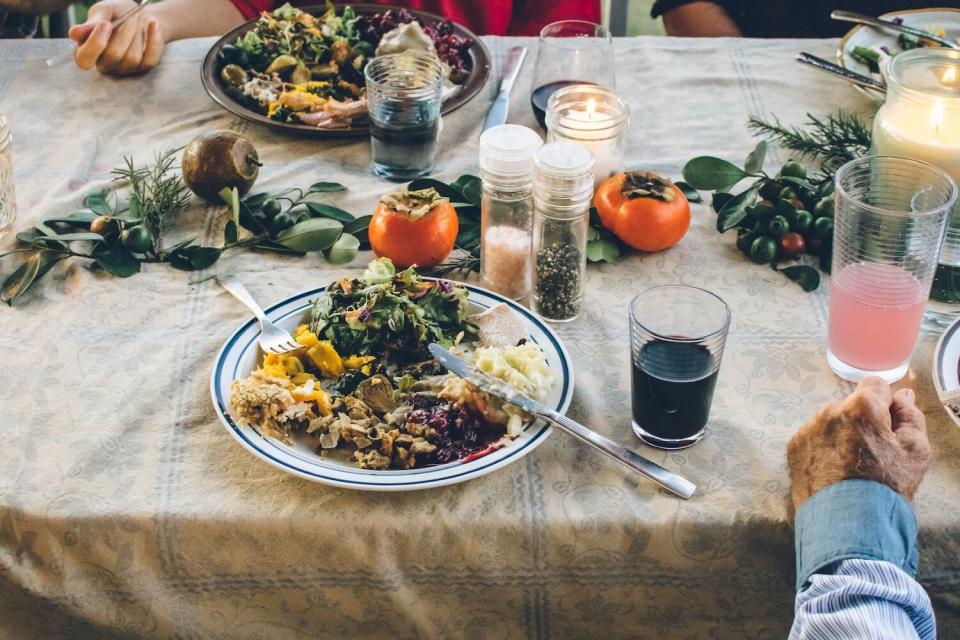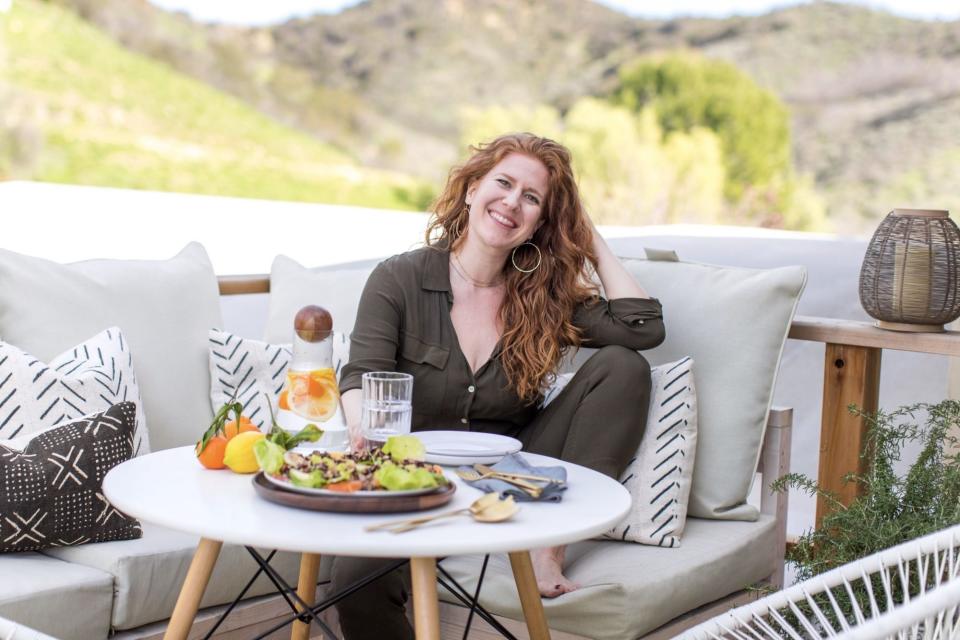I Reinvented the Holidays After My Mom Died: Here’s What I Learned
We never had a turkey. Thanksgiving with recovering hippie parents and our chosen family in Hawaii, where I grew up, was more an eclectic exercise in Friendsgiving than a buttoned-up colonial homage. There was no emotional subterfuge between siblings, no tipsy Aunt Mary, belligerent Uncle Bob, or creepy cousin Steve. We did Thanksgiving and every other holiday a bit differently—until we didn’t do them at all.
But before my mother died, before the waning of the holidays, Thanksgiving was flocks of wild turkeys passing through our bucolic front yard, bordered by ranch land. A pomegranate tree generous with fruit. The tick-tick-flare of our gas stove. My mother’s hands peeling sweet potatoes. Saucepans of melted butter. Fresh cranberries bobbing in orange juice. And where there might have been a turkey, a tray of cornmeal-crusted tofu ready for the oven. We were vegetarians after all.
I don’t remember my last Thanksgiving with my mother, or my first. But the in-between—tables laden with foods my mother inherited from her lineage of eastern European Jewish matriarchs, reinterpreted by way of California and Hawaii in the ’70s and ’80s—was an untraditional smorgasbord of comforts. Around the table, a ragtag group of family and friends eager to express gratitude and eat good food. Before the meal, we would hold hands, sometimes with those we’d never met before, and listen in as each guest recited a sometimes saccharine, sometimes sincere reflection of gratitude. We reveled in the well-intentioned meaning of the ritual.

Courtesy of Lily Diamond The author hosts Friendsgiving on Maui.
Like many families, we never discussed the shadowy history of the holiday itself or the legacy of colonial oppression in which it is rooted. Thanksgiving, to me, only meant the privileges of warmth, safety, good food, and gratitude. It meant a long weekend off of school, connection with people I loved, and a gauzy kind of indulgence I took for granted. Held tightly by an illusion of plenty for all, I didn’t understand how quickly it could be dismantled, how the very same day could also bring the loss of all of those comforts, a groundlessness of grief.
My mother died when I was 24, and in short order, the holidays became something equivalent to an emotional triathlon. Every “holy day” was a potential source of grief and paralysis, every wish of good cheer an opportunity to despair at my mother’s absence. Days passed when I wished the holidays—and their attendant emotional inflations and commodifications—would disappear, just as she had. Such pressure applied to the open wound of loss often felt unbearable. Even the mashed potatoes hurt.
The first holiday season after she passed, I was left with a blur of memories too painful to retain in full clarity, and the sudden emergence of two questions:
What good did these so-called “holidays” do in the first place? And if my mother wasn’t here to do them for my father and me, would we choose to do them ourselves?
Before the cancer and the dying, my mother knew how to create ritual—and she taught me the same. This was what she used holidays for: Our holy days rarely appeared as mainstream America intended, but were instead ways of making meaning out of the complex tapestry of human experience and history. Her rituals were patterns of life that brought us together, passing from her to me a secret, ancient language of substance and significance.
No stone of tradition went unturned, as she imbued her own eclectic spirituality into lighting Hanukkah candles, growing grass in Easter baskets (yes, actual living grass), and pressing flowers into handmade paper for valentines. In the void of her absence, I discovered she had almost singlehandedly carried the responsibility of making the holidays happen for our triad. Of making meaning, bringing us together around ideas and love, and planting the ethos of our family through ritual.
After two years of grief-laden Thanksgivings, Hanukkahs, and Christmases, I couldn’t go on as things were. My father and I could hardly summon the energy to figure out plans, let alone replicate the traditions my mother had created for us year in and year out. But I desperately needed to feel the familial grounding my mother provided—and to know we could move forward, without her. I kept returning to some small flame of desire for gathering, for community, for the meaning marked by, yes, the holidays.
Somewhere within my fog of grief, I realized it was up to me to grow up, to continue, to make my own rituals. My own meaning. To reinvent those traditions.
Thus began a project of creating a holy day anew, in ways that honored my mother’s memory, yet also reflected who we were as a family (comprised largely of chosen family and friends)—and who I was as an adult, aware of the complexities associated with so many of the holidays I once took for granted. As my mother had before me, I would have to find new ways of making meaning with the people I loved.
Instead of resisting invitations, my father and I began to accept the uncomfortable newness. I unearthed as many of her recipes as I could, querying my dad, and my mother’s sisters and best friends for forgotten secrets. I made my own pathways into baked sweet potatoes with butter-simmered apricots, raspberry Linzer torte, and, yes, cornmeal-crusted tofu.
And maybe more importantly, I found my own rhythms and recipes: A friend’s life-changing shiitake mushroom gravy became an instant, un-live-without-able classic. A pumpkin pie layered with caramelized pecans and encased in a gingersnap crust. A kabocha squash and goat cheese galette with caramelized onions and fennel. Pomegranate arils. New ways of tasting gratitude.

Courtesy of Marisa Vitale The author in a moment of rest, pre-hosting.
Perhaps I was stepping into my mother’s proverbial holiday shoes, or perhaps I had finally begun to cultivate my own seasonal rites. There was a sweetness in feeding those I loved. In spending half a day cooking with my father, and the other half giving thanks—real, meaningful thanks because we’d all chosen to be there, together—with family friends. In watching children I’d known since the moment of their birth set the table. In adults fighting over the last of the life-changing gravy.
Here it was, then: A way to co-exist with the holiday that was not just about loss, but also about creating anew, creating because I was still here, still alive.
The history of Thanksgiving would always be fraught with intercultural and personal grief, but being awake to my own loss afforded me the space to bring new questions, and new possibilities, to everyone at the table. To make meaning of painful histories that demanded we create new futures.
Eleven years later, it’s still strange to look around a crowded Friendsgiving table and find my mother missing. I still flinch at the mention of holiday planning. But reinventing Thanksgiving without her taught me more about myself and my orientation to family, food, community, and gratitude than I would’ve known were she still here. My mother’s absence taught me to feel my life, myself, as whole, whether alone or with people I love. To know that in the end, we all belong to each other.

